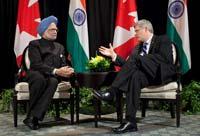Canada to harness India’s rich and vibrant soft power

By Arvind Padmanabhan and Gurmukh Singh
A nuclear deal, the announcement of a yearlong festival and a salute to Indo-Canadians this week marked the full turnaround of Canada’s relationship with India from one of suspicion and unease to one of collaboration and cooperation.
Canada, which had led India’s nuclear isolation in the mid-1970s and late 1990s, is now the ninth nation with which New Delhi has a peacetime atomic energy pact, opening the doors for bilateral nuclear commerce on the lines India has with the US.
The pact, paving the way for Canadian firms to take part in India’s $40 billion nuclear energy business over the next 10 years, was inked after a meeting between Indian Prime Minister Manmohan Singh and his Canadian counterpart Stephen Harper.
Manmohan Singh also announced a year-long festival of India in Canada, showcasing not just New Delhi’s rise in the global strategic and economic sphere but also its rich and vibrant soft power.
“To foster close cultural bonds between India and Canada, I am happy to announce that we will organise a year-long festival of India in Canada in 2011,” Manmohan Singh said in Toronto at a banquet hosted by Harper.
Saluting Canada’s 1.1-million-strong Indo-Canadian community at the banquet, Manmohan Singh particularly acknowledged their contribution during the difficult times between the two countries.
“The community constitutes a bridge between our two countries that has remained strong and unshakeable even in the most difficult circumstances,” the prime minister said in an obvious reference to Canada’s reaction following New Delhi’s nuclear tests in 1974 and 1998.
“I would like to especially acknowledge their presence here today and wish them even greater success as citizens of Canada,” he said.
“We applaud the opportunities they have been given to contribute to their social and economic development,” the Indian prime minister said, while also praising the Canadian governments at the federal and provincial levels.
The banquet attended by about 500 Indo-Canadian movers and shakers had a large contingent from British Columbia, including MLA Dave Hayer, Former MP, Gurmant Grewal, Indian Consul General in Vancouver, Ashok Das and South Asian Post publisher Harbinder Singh Sewak.
Bollywood megastar and Toronto resident Akshay Kumar who will leverage his celebrity status in India to promote Canada as the Canadian Tourism Commission’s (CTC) Ambassador for India, was the MC at the banquet.
“Harper and Manmohan Singh have paved the way for a new era between the two countries,” said Sewak.
“Everyone at the banquet had a sense of excitement about the future…as Manmohan Singh kept saying at the dinner, the best is yet to come,” added Sewak.
Before the banquet, Manmohan Singh assured that the nuclear technology and material supplied to India under civil atomic energy pacts will only be used for peaceful purposes.
“There is absolutely no scope whatsoever of the nuclear materials or nuclear equipment in India being used for unintended purposes,” Singh said at a joint press conference with Harper.
Alluding to the sanctions imposed by Ottawa after the nuclear tests conducted by New Delhi in 1974, the Canadian prime minister said in the contemporary world his country could not act as though it was living in an era that existed 30 years ago.
“We are living in very different realities today. India is a country - a very important country - a country that will be even more important in the future that shares with us key values.”
He said New Delhi and Ottawa today shared common interests and also faced common threats. Canada, he added, was keen that India, which urgently needs energy, develops its nuclear industry and wanted to be a part of the initiative.
According to data available with atomic energy department, India currently has 19 nuclear reactors at six locations, all operated by the state-run Nuclear Power Corp of India, with a capacity to produce 4,560 MW of electricity.
The plan is to quadruple this capacity to 21,180 MW by 2020, taking the share of nuclear energy in India’s total installed electricity-generation capacity of around 150,000 MW, from around 3 percent to a little over 10 percent.
While Canadian firms, like those in other countries, cannot yet produce nuclear energy in India that has been reserved for state-run firms by law, they can supply equipment and components - which, in itself, is a big business, officials said.
The two countries also signed the following bilateral pacts:
-On higher education to encourage the development of synergies between Canadian and Indian post-secondary institutions.
-On earth sciences and mining to foster improved dialogue on mining and related activities, including bilateral investment.
-On cultural cooperation to facilitate bilateral initiatives and help showcase Canadian cultural content in India, and Indian cultural content in Canada.
Both countries also identified clean energy as the priority area for cooperation, while resolving to grow their bilateral trade nearly three-fold to $15 billion in the next five years.
The India-Canada deals and meetings on the sidelines were key events as the world’s 20 most powerful developed and developing economies promised to slash their budget deficits in a manner that fosters growth in Toronto.
The promise of “growth-friendly fiscal consolidation” for rich countries marked a key compromise between the United States, which has pushed for more public spending, and Europe, which has already announced austerity measures in the wake of Greece’s debt crisis.
Wealthy countries also agreed to halve their budget deficits by 2013 and committed to “stabilise” their level of government debt by 2016 - two targets seen as a victory for the European Union.
“To be honest, it’s more than I had expected, because it’s very specific and was accepted by all the industrial nations. I think that that is a success,” German Chancellor Angela Merkel said.
– with wires









